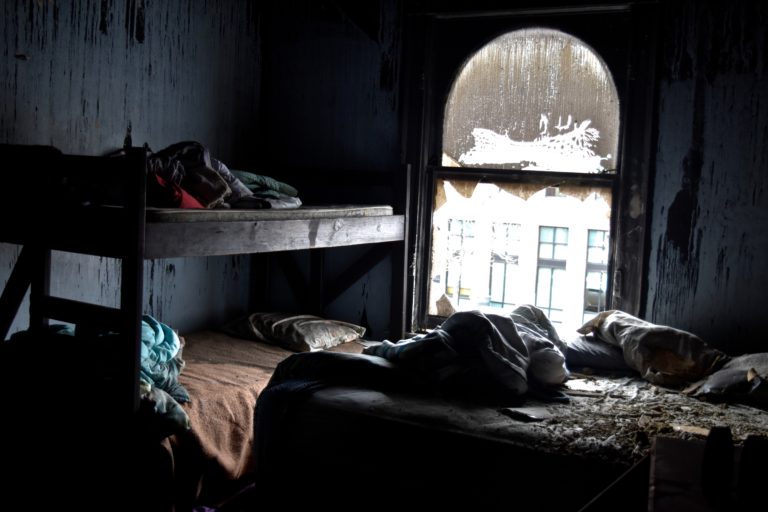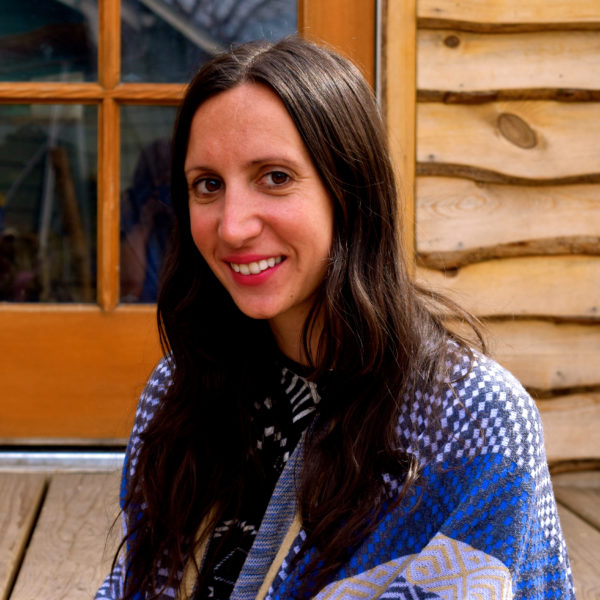
After a fire destroyed the Denver Catholic Worker House in January 2016, the author took these photographs of the interior of the building on the last day they were allowed to enter. Image by Kristen Brunelli/Kristen Brunelli, © All Rights Reserved.
When the Walls Come Down: Family Forged in a Catholic Worker House
At one in the morning, in mid-December, 2012, I heard Marcus introduce a woman to the room next to mine.
“Here is your room,” he said. The floors bent beneath them. “Let us know if you need anything.”
It was a week before Christmas, and my voice was hoarse from practicing carols. I whispered below to Sarah, with whom I shared a wooden, teal-painted bunk bed. She was a 23-year-old who’d been living as a volunteer at the Denver Catholic Worker house for almost a year. I’d arrived in September, and, at that point, I was still new to the natural transition, the in-and-out of our guests.
“They found someone,” I said. Something settled in me, like a drifting seashell had found its place. Sarah shifted and went back to sleep.
The brick building next to ours was but a foot away, and when daylight came, only a pale glow at the base of our window suggested it to me. But a sense of anticipation stirred. There was a childish joy those first few months, like falling in love.

After leaving work at a charity, I’d moved from New York City to be a full-time, live-in volunteer at the Catholic Worker House in Denver. I’d been volunteering at the CW shelters in the East Village, helping out on the soup lines, but I desired a smaller community, an atmosphere of intimacy, one of family. Catholic Worker houses around the world act autonomously, rather than under the supervision of the Catholic Church hierarchy, and each offers something unique. In Denver we offered rooms to single women, one couple, and one family.
A couple days earlier, a determined woman of 50 had abruptly moved out. During her two-month stay, she was able to find two part-time jobs and save up. It was a happy, though unusual, change that she was able to leave so quickly, and we were glad to offer the room to someone new.
Our house was almost like that of any other family. We ate dinner together; some complained about the cooking. We took turns doing dishes. We sat in front of the fire and read. We drank tea. Unlike most residences, if one of our bedrooms became vacant, there was an urgency, a readiness to fill the space — and typically it would be filled quickly, with as many as 15 calls per day from people seeking shelter. This was a weight we carried, a burning awareness of how many in Denver are forced to sleep outside, hidden in alleyways, underneath stairwells, behind dumpsters.
The day before, Marcus told us, “If the room is still empty by the end of the day, we’re going to see if we can find someone who needs it. It’s damn cold out.”

Inside, we saw our breath clouding before us. I fixed breakfast. Marcus sat in the dining room with our newest guest, Danielle, a middle-aged woman with too few teeth, long, tea-colored fingernails, and broad shoulders.
“How did you sleep?” he asked her.
“I’ve slept better,” she said. Marcus and a friend had met her at midnight as they walked around the 16th Street Mall, an avenue where many homeless people linger. There are lights overhead, people passing, which creates a feeling, though sometimes false, of safety.
“Do you want somewhere to stay?” they’d asked Danielle. She’d been sitting up on a bench, her bags beside her; she feared if she lay down she’d be breaking the “urban camping” ban, which makes it illegal for homeless men and women to cover themselves from the elements while sitting or lying down outside. With Denver Homeless Out Loud, a group of people who have either experienced homelessness and/or advocate for the homeless, Marcus had been surveying hundreds of people directly experiencing homelessness, seeking to find out how this law, effective since May of 2012, had affected their lives.
He asked Danielle how she ended up without housing, and how and if we, as a home, could provide support to her. Danielle was unable to give him much. She spoke of “the courts” and of her children, “kidnapped” by her husband. She spoke of sex trafficking and the murder of her Cocker Spaniel. Her thoughts surfaced in disjointed turnabouts, jolting from one to the next in surprising, discomforting ways — her pupils, nestled in green, followed them this way and that. She was defensive, suspicious. Scared. She seemed far away, stuck in a reality that perhaps once was.
Over time, we realized it would only cause her harm to try to shake her into this one. Two years later, during our Solstice gathering at the house, she explained to me what grace was, and asked me to come outside to watch the snow fall.

After 37 years of offering hospitality to people without a home, on January 28th, 2016, the Denver Catholic Worker house burned down. A fire tore up from the back of the house at 3 a.m., displacing 12 people. The cause is still unknown.
By then, Marcus and I were living in the tiny 180-square-foot house we’d finished building in July, planted in Sarah’s back yard, just across town. Danielle, like the other guests who’d been living at the Worker at the time, was offered a credit card from the Red Cross, urged to use it to stay at a motel. We were not surprised when we heard from other residents that Danielle had refused the card and walked away, speaking to herself.
A day after the fire, as the temperature was dropping, we found her on the 16th Street Mall, where she’d been in the middle of the night, just before Christmas, three years earlier.
Danielle has been living with us since. She does not trust many people. Sarah and her partner have opened their one spare room to her, and with Marcus and me only feet away, not much has changed. We share meals, coffee; we listen to each other. Only, now, we don’t try to see beyond our differences. We don’t have to practice hospitality. There is no struggle in seeing the good in Danielle. The walls have come down. She is family.



Share your reflection